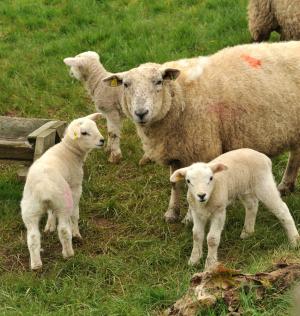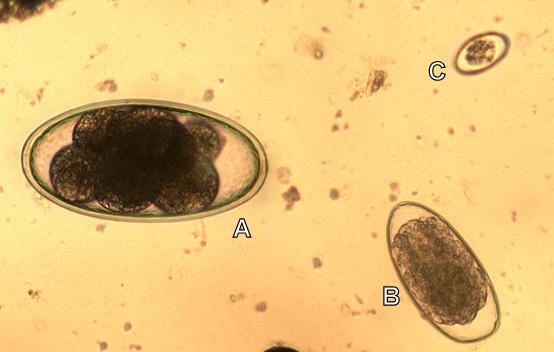AFBI issues Nematodirus Warning – Spring 2023
Date published:
The Agri-Food and Biosciences Institute (AFBI) Veterinary Sciences Division wishes to advise sheep farmers of the likely risk of Nematodirus worm infection in young lambs, currently occurring at this time of the year.

Nematodirus infection results from the ingestion of large numbers of infective worm larvae present on contaminated pasture. Lambs grazing the same pasture in the previous year were the source of this contamination. For Nematodirus eggs to hatch they should experience a period of cold weather followed by warmer conditions. These conditions are usually achieved during the winter and spring of each year.

Using a forecasting system based on climate data, staff at the Institute have determined that hatching of Nematodirus eggs has already commenced, and that 10% of the annual hatch would have occurred in mid-March 2023. The current meteorological readings indicate that peak hatching is taking place at present, in this first and second week of April 2023.
Nematodirus normally only affects lambs between 6 and 12 weeks of age and clinical signs usually appear two weeks after ingestion of large numbers of larvae. Although rare, Nematodirus infection can occasionally cause problems in young calves. Therefore, farmers should be on the alert for signs of scour in lambs (and possibly young calves at grass) from mid - April into May.
Farmers should be aware that Nematodirus infection might be confused with coccidiosis, another disease which can cause severe scour in young lambs. As the treatments for Nematodirus infection and coccidiosis are different, accurate diagnosis and treatment recommendations, through your veterinary surgeon, are essential.
Nematodirus disease can be avoided or reduced in lambs by:
- not grazing lambs on the same fields as those grazed by lambs of a similar age last year.
- using anthelmintic drenches every 2 to 4 weeks. The interval between doses depends both on the particular anthelmintic used and the severity of infection. To date, only limited evidence has been found of drug resistance in Nematodirus to any of the available classes of anthelmintic.
Your veterinary surgeon should be consulted at an early stage. He or she is in an ideal position to provide advice on the prevention and /or treatment strategy best suited to your particular circumstances. AFBI’s Veterinary Sciences Division can test faeces samples from sheep or cattle to determine the level of worm eggs present. A minimum of 5 grams of faeces from each animal is required for this test.
Notes to editors:
AFBI’s Vision is “Scientific excellence delivering impactful and sustainable outcomes for society, economy and the natural environment”.AFBI’s Purpose is “To deliver trusted, independent research, statutory and surveillance science and expert advice that addresses local and global challenges, informs government policy and industry decision making, and underpins a sustainable agri-food industry and the natural and marine environments”.AFBI’s core areas:Leading improvements in the agri-food industry.Protecting animal, plant and human health.Enhancing the natural and marine environment.